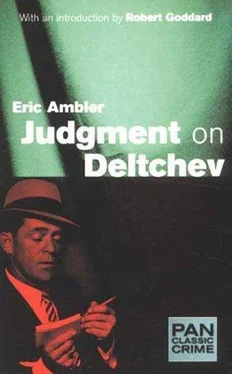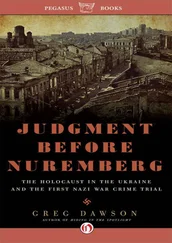Eric Ambler - Judgment on Deltchev
Здесь есть возможность читать онлайн «Eric Ambler - Judgment on Deltchev» весь текст электронной книги совершенно бесплатно (целиком полную версию без сокращений). В некоторых случаях можно слушать аудио, скачать через торрент в формате fb2 и присутствует краткое содержание. Год выпуска: 1977, ISBN: 1977, Издательство: Vintage, Жанр: Криминальный детектив, на английском языке. Описание произведения, (предисловие) а так же отзывы посетителей доступны на портале библиотеки ЛибКат.
- Название:Judgment on Deltchev
- Автор:
- Издательство:Vintage
- Жанр:
- Год:1977
- ISBN:9780307049971
- Рейтинг книги:4 / 5. Голосов: 1
-
Избранное:Добавить в избранное
- Отзывы:
-
Ваша оценка:
- 80
- 1
- 2
- 3
- 4
- 5
Judgment on Deltchev: краткое содержание, описание и аннотация
Предлагаем к чтению аннотацию, описание, краткое содержание или предисловие (зависит от того, что написал сам автор книги «Judgment on Deltchev»). Если вы не нашли необходимую информацию о книге — напишите в комментариях, мы постараемся отыскать её.
Judgment on Deltchev — читать онлайн бесплатно полную книгу (весь текст) целиком
Ниже представлен текст книги, разбитый по страницам. Система сохранения места последней прочитанной страницы, позволяет с удобством читать онлайн бесплатно книгу «Judgment on Deltchev», без необходимости каждый раз заново искать на чём Вы остановились. Поставьте закладку, и сможете в любой момент перейти на страницу, на которой закончили чтение.
Интервал:
Закладка:
Suddenly there was a tremendous roll of drums, and over the entire Square the crowd fell silent. The drums ceased abruptly. Then the bands began to play the People’s Party marching song. All heads were turned toward the palace portico and the aisle of steps that ran down between the upper boxes to the saluting base. Through the loudspeakers came the sound of a choir singing the song. The crowd joined in. The air seemed to quiver with the sound. Then, as the song reached its climax — the great shout of affirmation that came on the final note — Vukashin appeared at the top of the steps and the cheering began.
He was wearing a black suit and had a cloth cap in his hand. For a moment he stood there motionless. Then he raised a hand in salute and began to walk down the steps toward the saluting base, while the cheering swelled up. When he was about two steps down, a man in the uniform of a marshal stepped from the group behind him and began to follow. The Minister of the Interior came next. And then Brankovitch started down.
He, too, was dressed in black, but very neatly, and he wore a grey Homburg. He walked down slowly and deliberately as if he were unaware of what was going on in the square below. As he passed the upper boxes, the occupants of which were clapping, he nodded casually to someone he knew there.
Vukashin had reached the base. Now he walked forward to the balustrade and looked down. A fresh storm of cheering greeted him. The marshal and the Minister of the Interior moved to left and right of him. Brankovitch moved to the balustrade beside the Minister of the Interior and said something to him. The latter smiled and pointed to the Victory. By this time the whole length of the balustrade was occupied. There were two or three uniforms, but most wore dark suits with grey Homburgs. There was only one cloth cap — Vukashin’s. On the other side of Brankovitch was a stout man who held himself as if he had a boil on his neck. They were about a foot apart. Brankovitch turned sideways to say something to him.
Vukashin raised his hand in acknowledgment to the Victory tableau, and with a jerk it set off again. At the same moment the bands struck up and the main procession began to move in.
It was headed by a detachment of men in white dungarees marching eight abreast. But I barely noticed them. My eyes were on Brankovitch. He was still talking to the man at his side.
As clapping and cheering broke out again, I began desperately to try to reassure myself. It just could not be! I had been listening to the babblings of a lunatic. Or — better, far better! — the verdict of Passaic and Oakland and Hagerstown had been that those things which were God’s should be rendered unto God, that Article something-or-other-of-the-Constitution-of-the-United-States-of-America — nobody can do anything that affects the life, liberty, or person of anybody, without the aforesaid democratic procedure — is properly and faithfully observed, and that the best thing Georghi Pashik could do would be to get his fat arse the hell out of it and send that suit to the cleaner’s.
I was suddenly sure that it was going to be all right. At any moment now Pashik would appear beside me, businesslike, courteous, and all for playing ball with the regime. I almost laughed with relief. The time was two nineteen.
And then it happened.
The head of the parade had curved into the straight in front of the saluting base and Brankovitch turned to look at them. For a second or two he stopped talking and was absolutely still. The next moment the toneless, tearing rattle of a burst of Spandau fire echoed round the Square. And almost, it seemed, before the echo of the first had done one leg of its journey, a second burst came.
I had my eyes on Brankovitch. There must have been some sort of stool or bench behind each of them to rest against during the parade, for he lurched back as if he were falling and then stopped for a moment. I saw the second burst hit him in the neck. Then he turned slightly sideways as if he were going to talk to the Minister of the Interior again and crumpled out of sight behind the balustrade.
The man with the boil was the quickest witted. He took cover behind the balustrade a second after Brankovitch fell. There might, after all, have been other bullets on the way. The Minister of the Interior just stood staring. Vukashin gave one quick look round, then went as if to help Brankovitch. I think that for about ten seconds only a very few of the spectators realized that there was anything amiss at the saluting base. Most of them had just shifted their attention to the parade. But someone screamed. At the same moment men began shouting above the noise of the bands, and the bodyguard closed in defensively round the saluting base with their guns pointed at the crowd. Then a wave of panic came. All at once everyone seemed to be shouting or screaming. The bands stopped and the parade slowed uncertainly. The Winged Victory, now on the far side of the Square, jerked to a standstill. I saw one of the girls fall off the plinth as a great mass of people trying to get out of the Square surged forward round the thing. A man near me in the press box was shouting like a maniac. I was very near the exit. I stumbled to it and got down the steps. An official coming up shouted something and tried to stop me, but I pushed past him and made for the narrow street that ran between the cathedral and the adjoining building in the Square. This street had been closed by the police and made to serve as a main entrance for box-ticket holders and I thought that if I could get behind the cathedral before the crowds in the Square were completely out of control and the surrounding streets impassable, I might reach the hotel in time to finish what I had to do.
Others in the boxes had had the same idea. The street was filling rapidly and most of the people were running. I began to run too. By the time I reached it, the police barrier at the end had been swept away and people were clambering over the remains of it to join the frantic stream pouring out of the square. It would have been difficult to walk then even if I had wished to, for to the shouting and screaming in the square behind us was now added the sound of shooting as the bodyguard fired over the heads of the panic-stricken crowd. Everybody ran. I must have run about a quarter of a mile before it seemed safe to walk. People had begun to sink down exhausted on the pavements. Many of them were crying. I walked on and found myself in a street of small shops. I had no idea whereabouts I was. The shopkeepers had put their shutters up for the day and I did not want to try asking anyone who knew what had happened for directions. It was not a good moment to reveal oneself as a foreigner.
I walked on aimlessly, looking for a familiar landmark. What I felt I had to do was to see Madame Deltchev and tell her about Pashik before I went. In the confusion I had had the absurd idea that I might get my bag and typewriter from the hotel, be driven to the Deltchev house in a hotel car, and go straight on to the station from there. I knew now that that was out of the question. Even if I managed to find my way to the hotel and hire a car, the chance of getting anyone that day who was willing to drive to Yordan Deltchev’s house was small. And that made me realize something else. Unless I could get to the house before news of the assassination reached the sentries on the door, the chances were that I would not be allowed in. It was twenty to three now. Almost certainly the radio had shut down the moment the thing had happened. It would be at least an hour before any official statement was issued; but meanwhile the news and wild distortions of it would be spreading all over the city by word of mouth. I would have to be quick.
I hurried on. The sun was in my eyes. If I kept on walking west I must eventually come to the wall of the
Читать дальшеИнтервал:
Закладка:
Похожие книги на «Judgment on Deltchev»
Представляем Вашему вниманию похожие книги на «Judgment on Deltchev» списком для выбора. Мы отобрали схожую по названию и смыслу литературу в надежде предоставить читателям больше вариантов отыскать новые, интересные, ещё непрочитанные произведения.
Обсуждение, отзывы о книге «Judgment on Deltchev» и просто собственные мнения читателей. Оставьте ваши комментарии, напишите, что Вы думаете о произведении, его смысле или главных героях. Укажите что конкретно понравилось, а что нет, и почему Вы так считаете.












